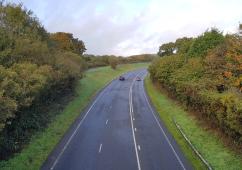Live Labs 2 blog - Wessex Partnership: Net Zero Corridors
Mike O’Dowd-Jones, Strategic Manager Highways & Transport for Somerset Council and Matt Philips, Highways Asset Manager for Cornwall Council talk about the Wessex Partnership's Net Zero Corridors project, comprising Hampshire County Council, Somerset Council and Cornwall Council.
Mike O’Dowd Jones gives an overview of what’s been happening on the project so far.
Project introduction
Hampshire County Council, Somerset Council and Cornwall Council make up the Wessex Partnership, with partners from industry and academia. We are working together to pioneer innovative solutions for decarbonising highways maintenance, supporting the UK’s route to net zero roads.
Wessex partnership: Net zero corridors – our aims
The project will progressively decarbonise maintenance across the whole asset lifecycle. Corridors will be a test bed for innovation, circular solutions and new ways of thinking.
As part of this, we will develop a toolkit for the industry as a whole so the project will be right at the forefront of this critical work for the highways sector and the UK to meet its carbon reduction commitments.
The three authorities chose to work together as we have such diverse networks (including geography, contracting models and material access), meaning that we will be able to thoroughly test and trial innovation across different settings. This will ensure that our findings are representative of highway maintenance on each local authority road ecosystem.
Our approach will be underpinned by the Doughnut Economics Model, a framework that balances environmental and social needs to ensure wider impacts are understood.
Nine net zero corridors
We have identified nine roads as Net Zero Corridors. This means that these nine roads will act as testbeds or proxies over the three years of the Live Labs 2 programme.
We selected these trial corridors as they are representative of the range and type of each authority’s network. The total combined length of the three authorities’ networks is 22,800km which represents 6% of Britain’s local highway network.
Site visits have been carried out on many of the defined corridors and the teams have workshopped these corridors together. This work has already highlighted areas of efficiency and changes that can be made now.
Progress so far
Since launching, the Wessex Live Lab has started work with the Future Highways Research Group. This has been supported by the project's dedicated carbon analyst, on collecting and analysing data to produce carbon baselines. This work will be critical to identifying areas of focus for the search and application of innovations.
This involves a deep dive into every part of the highway maintenance service, from how far people commute and travel when carrying out their work, right down to the materials they use to deliver their maintenance and treatment of roads. We hope that all three authorities in the Wessex Partnership will have this completed by January 2024.
Matt Phillips gives an update on the project from Cornwall’ Council's perspective.
I came across a great example this week in Cornwall on one of our Live Labs corridors, where some joined-up thinking can really make a difference to carbon reduction.
On a site visit we noticed that sign visibility was hampered by vegetation. The existing speed limit signs require an annual cut to prevent them being hidden within adjacent hedgerow vegetation. We found that moving the post and the associated Traffic Regulation Order (TRO) by just 5m will completely remove this maintenance activity.
Not only does this reduce carbon emissions, it also has a financial benefit and decreases risk. Cornwall’s wider transportation team are now considering this as a factor in locating signs for the remainder of their ambitious programme.
The core purpose of Live Labs 2 is about making changes that we can incorporate into our programmes. We need to improve our ways of thinking, take the blinkers off and accept that reducing carbon should always be in our thoughts no matter how small the issue.
Further information
- For more information on ADEPT Live Labs 2: Decarbonising Local Roads in the UK, please look at the Live Labs 2 section on the website
- For more information about the Live Labs Project, please visit The Wessex Partnership: Net zero corridors page
Authors
- Mike O’Dowd-Jones, Strategic Manager Highways & Transport for Somerset Council.
- Matt Philips, Cornwall Council’s Highway Asset Manager.

